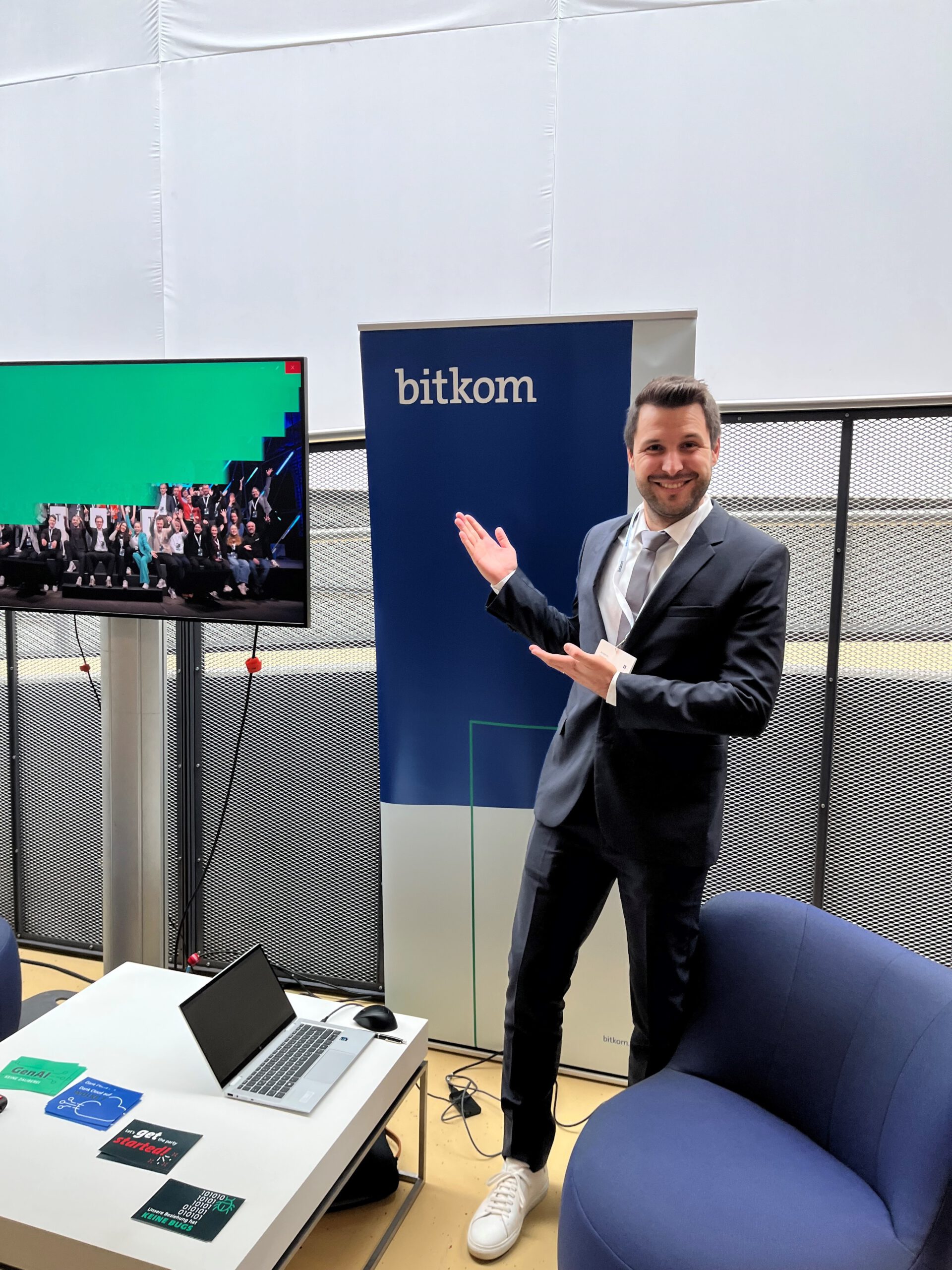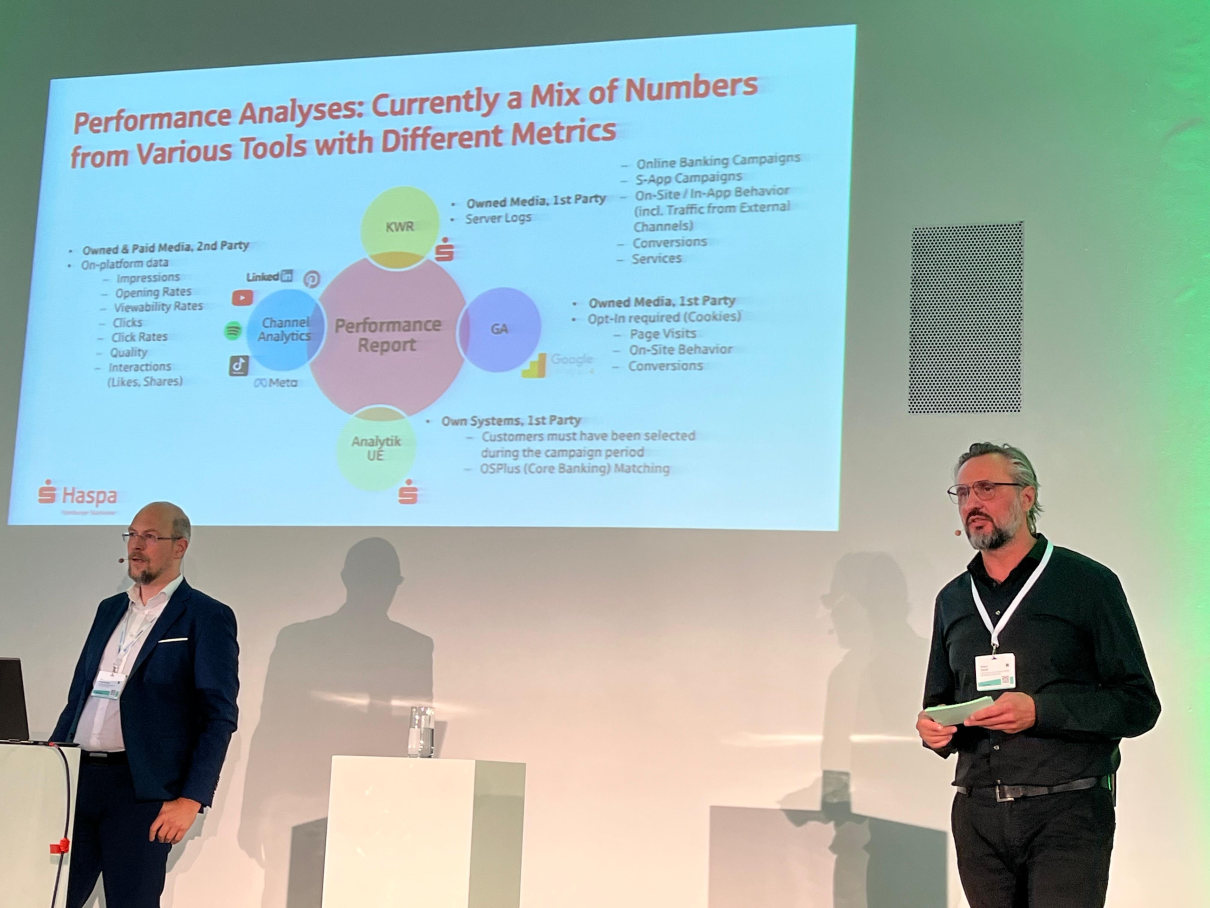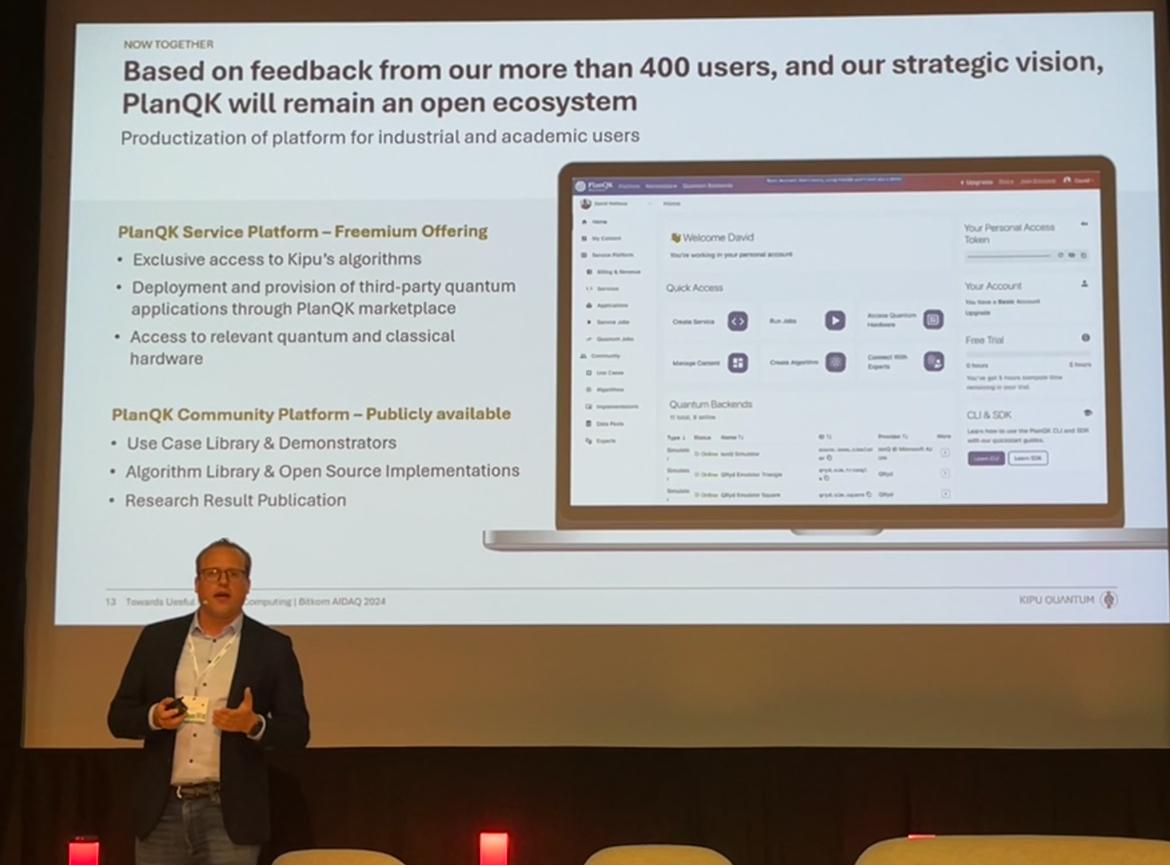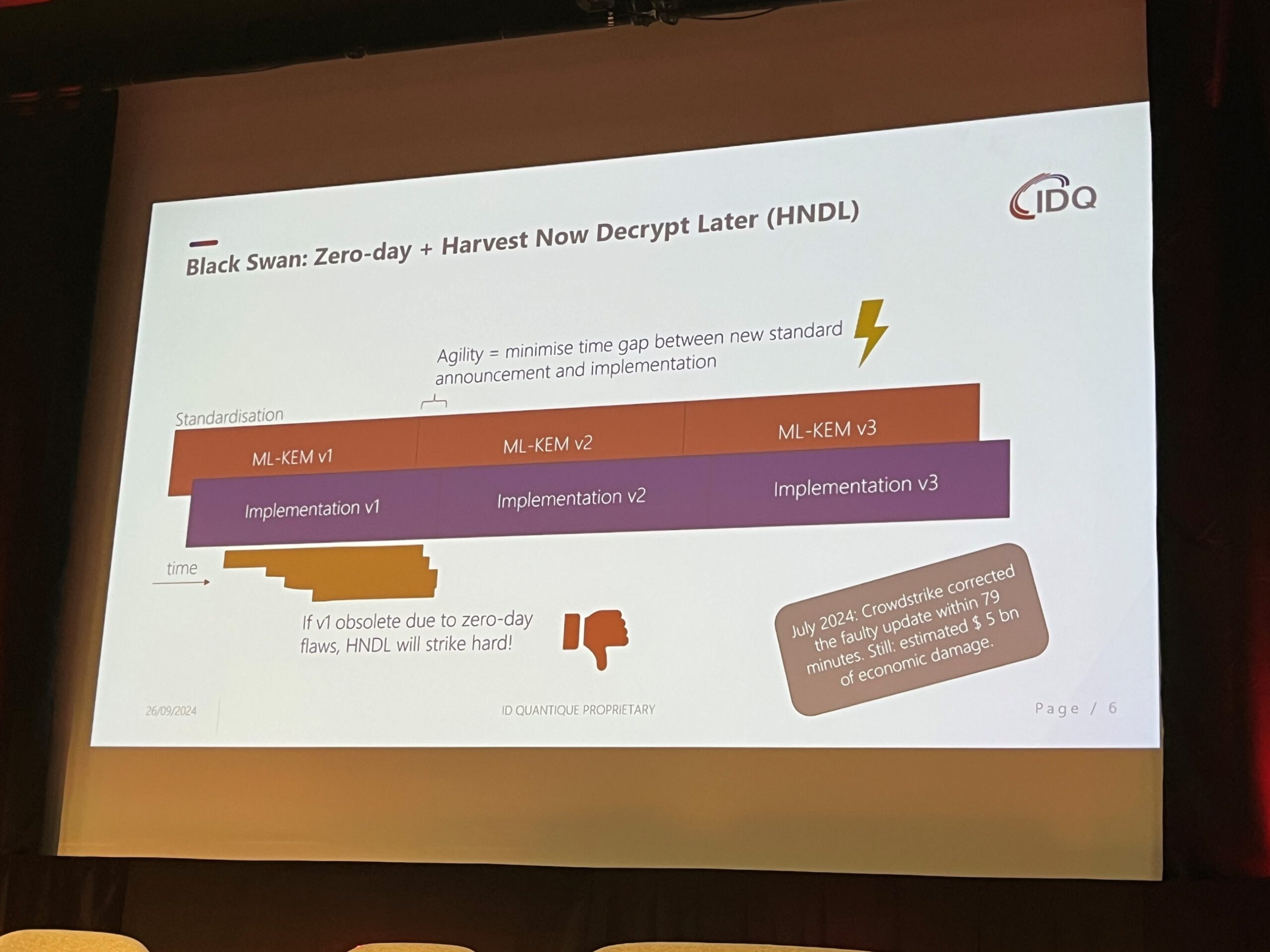Our colleague Andreas Dietrich visited the AIDAQ 2024 conference. This conference covers artificial intelligence and quantum computing. He chose the conference for his personal development and found it an efficient learning opportunity conveniently available in his hometown. On the other hand, he missed some aspects necessary to establish EU leadership in these emerging fields. What do you think?
Recently, Bitkom hosted a remarkable gathering of 1,800 „architects of the future,“ all united by a single ambition: for the European Union to rise as a formidable contender in the realms of artificial intelligence (AI) and quantum computing. According to Bitkom President Dr. Ralf Wintergerst, Europe can no longer afford to merely „play to not lose“; it must „play to win.“ This insightful framing underscores the urgency for Europe to adopt a proactive stance in the global tech race against titans like the United States and China.

The Fragmented Landscape of Innovation
A significant theme arose during the discussions, especially articulated by Christine Knackfuss, CTO of T-Systems. She zeroed in on a core issue: scaling businesses efficiently across the fragmented landscape of funding and initiatives within the EU. The current piecemeal approach hampers the growth potential of many startups and innovators who lack the unified financial support necessary to compete effectively.
An Ironic Presence at Bitkom
The irony of the event’s dynamics was hard to overlook. Bitkom is a national initiative based in Germany, yet its representation of leading European companies was disheartening. Notably, while Aleph Alpha delivered a keynote, startups like Mistral were conspicuously missing from the agenda. Out of the ten most valuable European companies, only two – SAP and Siemens – had a presence at the conference, highlighting a significant gap in involvement from the continent’s tech giants.
Despite this scene, the potential for innovation thrives within smaller, local players. For instance, HASE & IGEL presented a groundbreaking case study with Hamburger Sparkasse AG, showcasing AI-based dashboards that deliver analytical insights and strategic recommendations. This innovation rekindled memories of the early successes within the B2B software space, reminiscent of SAP and Celonis.

Additionally, Kipu Quantum is on a mission to become the leading software platform for quantum computing. In discussions with their marketing manager, Joanna Folberth, it was clear they are carving out a competitive edge by being hardware-independent, efficiently aggregating solutions rather than merely delivering first-hand. However, as history has shown with initiatives like Gaia-X, independence doesn’t automatically translate to success. The dominance of giants like AWS, Azure, and Google Cloud Platform in the cloud arena remains a formidable barrier.
While I admired Kipu’s ambitions, I still found the current European infrastructure insufficiently robust to truly capitalize on their potential. The region needs stronger systemic support to realize its goals in AI and quantum computing.

Engaging Conversations Amidst Shortcomings
Despite the aforementioned challenges, the talks were thoroughly engaging, leaving attendees yearning for more insights. The breadth of knowledge exchanged was inspiring, and I wished I could have experienced every session firsthand.
Unfortunately, logistical issues loomed; the limited pizza supply, spotty mobile networks, and unreliable timekeeping occasionally detracted from the experience. Yet, these minor inconveniences did little to overshadow the rich discussions that filled the day.
As we navigate the future landscape, AI seems to be progressing toward Gartner’s „trough of disillusionment,“ while quantum computing is still largely underestimated. Insights from industry experts suggest that a serious recalibration of expectations is necessary.
A concerning scenario emerged during the discussions regarding cybersecurity vulnerabilities. Crowdstrike famously caused $5 billion in damages within just 79 minutes. Imagine the potential fallout if quantum computing leads to the decryption of all internet traffic. Some US experts have deemed the transition to post-quantum cryptography before 2035 „impossible.“ Yet, according to McKinsey’s Quantum Technology Monitor, advancements could make cracking RSA-2048 a reality by 2036.
If we consider the implications of an unchecked breakage of non-post-quantum cryptography, we could be facing catastrophic losses – theoretically translating to $33 trillion annually, should chaos mirror the incident with Crowdstrike. My hope is that organizations will shift from viewing this scenario as „impossible“ to recognizing it as an urgent call to action.

A Clear Challenge Ahead
Minister Dr. Robert Habeck astutely pointed out a tendency humanity has: a deep-seated skepticism towards change. Yet as we peer into the future, it’s evident that Europe must embrace transformation with conviction.
The urgency is palpable: let’s transform rhetoric into reality and champion the tech revolution together. It’s time for Europe to not just participate in the global tech narrative but to lead it boldly. Let’s play to win!
At Senacor, we apply GenAI efficiently every day. At the same time, we understand the importance of original content and have generated this article with the following detailed prompt using GPT-4o mini.
Please generate a concise and engaging 4000-character blog article covering the following key points. 1. Bitkom brought together 1800 architects of the future with one goal: the EU should "play to win" in artificial intelligence and quantum computing (like the US and China) and not only "play to not loose", as Bitkom president Dr. Ralf Wintergerst framed it 2. Core issue described best by Christine Knackfuss (CTO T-Systems) from my perspective: scaling businesses, because funding and initiatives are fragmented within the EU 3. The irony strikes me: a. Bitkom is a national initiative in Germany b. Aleph Alpha got a keynote, Mistral (and others) were not represented c. Out of the 10 most valuable European companies by market capitalization (source: https://companiesmarketcap.com/european-union/largest-companies-in-the-eu-by-market-cap/), only SAP and Siemens were present 4. There are local players with great products and ambition: a. HASE & IGEL for instance, showed a case study with Hamburger Sparkasse AG with game-changing AI-based dashboards for analytical insights and strategic recommendations, reminding me of previous B2B software successes such as SAP or Celonis b. Kipu Quantum aspires to become the no. 1 software platform for quantum computing as I learned in personal conversations with their marketing manager Joanna Folberth c. Competitive edge towards IBM: Kipu is independent from hardware providers and aggregates rather than delivering first-hand d. Unfortunately, independence does not guarantee success: Gaia-X has not managed to break the dominance of AWS, Azure and GCP in the cloud market e. I liked Kipu's ambition, but find the current European infrastructure insufficiently competitive to leverage their potential 5. Despite of this major shortcoming to address the core issue: highly interesting talks, I wish I could have attended them all (or at least get all the slides) 6. AI moving towards Gartner's trough of disillusionment, quantum computing still highly underestimated in my personal opinion 7. Crowdstrike created damage of 5 bn $ within 79 min, imagine the potential breakdown, if all internet traffic could potentially be decrypted: a. According to ID Quantique, some US key players deemed the rollout of post-quantum cryptography before 2035 "impossible" b. McKinsey's annual Quantum Technology Monitor from April 2024 extrapolates current algorithmic and hardware improvements, showing the possibility of cracking RSA-2048 before 2036 c. The report covers public data, not considering further classified advancements by military or secret services d. Let us asume, that the potential breakage of all non-PQC leads to a break-down similar to Crowdstrike and that this could happen in 2034 e. Theoretically: 5 bn $ within 79 min = 33 tn $ / year f. I hope, that if organizations ever face such impact, the term "impossible" will turn into "just not prioritized yet" 8. Too little pizza, mobile network not working in the whole venue & unreliable timeboxing made it hard to switch between stages at times, but overall totally worth the time and heavily inspiring 9. Missing: Neven's law (only Moore's law), a fully AI-generated (and delivered) presentation 10. Minister Dr. Robert Habeck delivered the potential reason: mankind always sceptical to change 11. Let's play to win!
